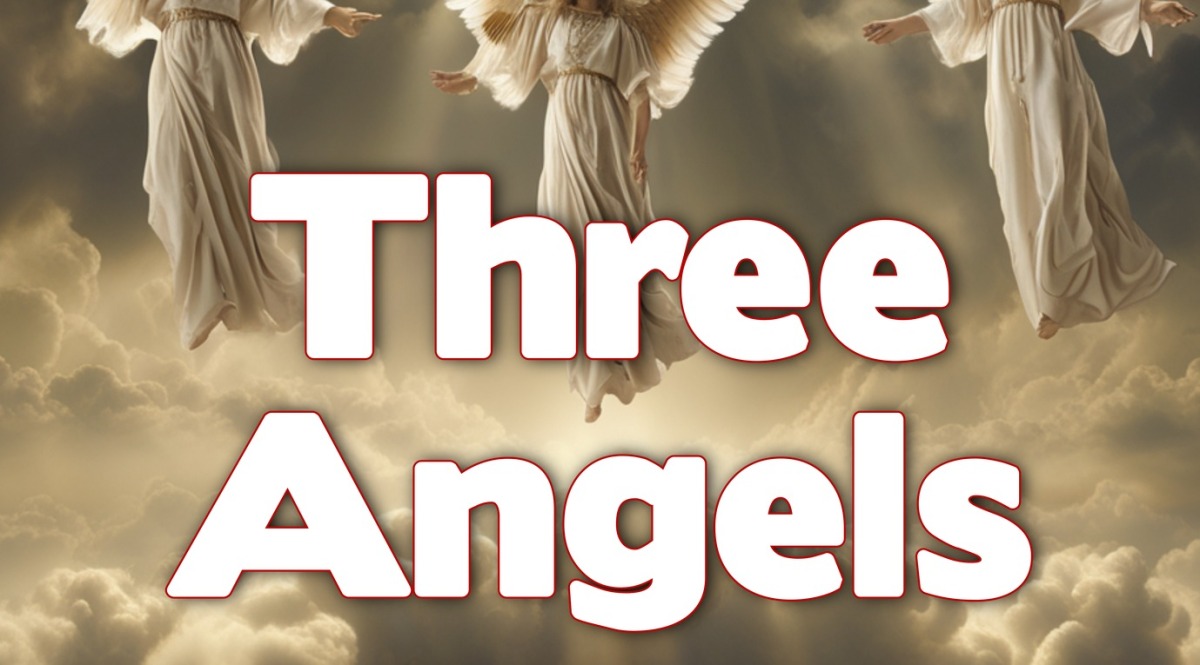Today’s reading is Revelation 14.
Angel, Angel, Angel to Those Who Dwell on the Earth
Okay, I admit it. That heading is a bit weird. But go with me on this. In Revelation 8:13, we read:
Then I looked, and I heard an eagle crying with a loud voice as it flew directly overhead, “Woe, woe, woe to those who dwell on the earth, at the blasts of the other trumpets that the three angels are about to blow!” (ESV)
As the sealed 144,000 (Revelation 14:1-5) contrast with those sealed by the false prophet (Revelation 13:16-18), the three angels shouting their messages in Revelation 14:6-11 contrast with the three angels who blew their trumpets of woe in Revelation 9-13.
An Eternal Gospel
I don’t mean to suggest a one-to-one correspondence between the two sets of angels. Rather, the full picture of each set contrasts with the other.
The first three angels proclaimed woe; the latter three proclaimed an eternal gospel. The three trumpets declared woe, sorrow, judgment, warfare, struggle to those who dwell on the earth. The latter three angels, however, proclaim an eternal good news to those who dwell on the earth (Revelation 14:6). But what is that good news? Judgment is coming. By itself, that doesn’t sound like good news. The good news part is that fearing, worshiping, and giving glory to the true God of creation (see Revelation 4:11) makes a difference in how judgment will impact people.
Repent and Believe the Gospel
If we are not careful, we may miss the really important point the seven churches needed to grasp. On the surface, we see what seems like two completely different sets of people. Those sealed by the Spirit versus those sealed by the false prophet. Those who worship the beast and the dragon versus those who worship the Lamb and the Father.
However, let’s recall two different groups we saw in the second woe. In Revelation 9:20-21, following the warning partial judgment of the sixth trumpet, we read, “The rest of mankind…did not repent” (ESV). However, in Revelation 11:13, following the ministry, death, and resurrection of the two witnesses and a warning partial judgment in which a tenth of the city fell to an earthquake and 7000 people are killed, we read, “The rest were terrified and gave glory to the God of heaven.”
The two groups contrasted by experiencing woe versus experiencing gospel are not one viciously evil group who always served the beast and one righteously holy group who always served Jesus. The two groups contrasted are actually one impenitent group versus the other group who repented. This, of course, takes us right back to the seven messages given to the particular churches. What were they repeatedly called to do? Repent.
All of this also takes us right back to Jesus’s primary message when He came on the scene. “Jesus came into Galilee, proclaiming the gospel of God, and saying, ‘The time is fulfilled, and the kingdom of God is at hand; repent and believe in the gospel'” (Mark 1:14-15, ESV). The gospel has always been and will always be, Repent! And you can experience the positive blessings of the kingdom, power, reign, rule, and even judgment of God. After all, as we noticed among the sealed 144,000, the issue was not how great the 144,000 were at preparing to meet God by their own strength, it was about being redeemed and ransomed by the blood of the Lamb. Only that redemption made their preparation worthwhile.
Day and Night
We must notice an incredible contrast in the middle of the three angel gospel:
And the smoke of their torment goes up forever and ever, and they have no rest, day or night, these worshipers of the beast and its image, and whoever receives the mark of its name (Revelation 14:11, ESV).
Do you recall what the accuser does? In Revelation 12:10, he accuses the brethren of the Lamb day and night. His attack is relentless. He tests and tempts and seeks a way to accuse us day and night. But hang on, if we give in to his temptations, the eternal torment will be far worse than his temporary testing and accusation.
Further, in the kaleidoscope of visions, we will come back to this judgment in Revelation 20:10. There we will learn the unholy trinity of dragon, beast, and false prophet will suffer this same torment day and night eternally.
By contrast, the redeemed of the earth who hold fast and let no one take their victor’s wreath, who have been ransomed by the blood of the Lamb, washed in His blood, and prepared to meet God on Mt. Zion are:
…before the throne of God, and serve him day and night in his temple; and he who sits on the throne will shelter them with his presence. They shall hunger no more, neither thirst anymore; the sun shall not strike them, nor any scorching heat. For the Lamb in the midst of the throne will be their shepherd, and he will guide them to springs of living water, and God will wipe away every tear from their eyes (Revelation 7:15-17, ESV).
Why do we hear of an eternal gospel and eternal good news? Because the shelter and refuge of King Jesus is not for a moment, an hour, a day, a week, a year. It is not even for 1000 years. It is day and night forever. And the alternative is horrific.
Which will you choose?
Today’s reading is Revelation 14.
PODCAST!!!
PATHS:
Discuss Today’s Meditation with Your Family
How does Revelation 14 admonish you?




